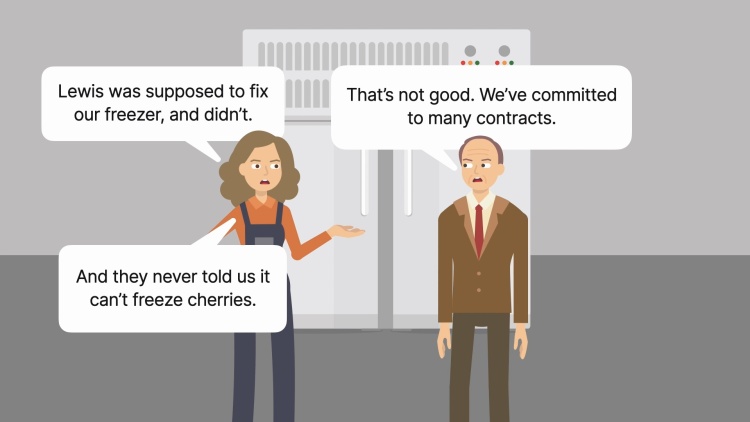Lewis Refrigeration Co. v. Sawyer Fruit, Vegetable and Cold Storage Co.
United States Court of Appeals for the Sixth Circuit
709 F.2d 427 (1983)
- Written by Megan Petersen, JD
Facts
In 1970, Lewis Refrigeration Co. (Lewis) (plaintiff) contracted to sell a commercial freezer to Sawyer Fruit, Vegetable and Cold Storage Co. (Sawyer) (defendant). The contract made certain representations about the level of performance of the freezer, as well as the amount of Freon the freezer would require. Under a warranty clause in the contract, Lewis guaranteed to provide any excess Freon required by the freezer. Lewis also guaranteed that in the event the machine failed to perform at the represented rates, Lewis would have the right to repair or replace promptly the malfunctioning part in the machine. Finally, the warranty clause provided that rescission was the only other available remedy. The contract also contained a separate remedy limitation excluding consequential damages in the event of breach. Lewis installed the Freezer in Sawyer’s business. The freezer malfunctioned, but Lewis made several delays in repairing the machine or testing its parts. In 1972, Sawyer decided to exercise its remedy for rescission. Sawyer failed to pay the balance due on the contract, and Lewis brought suit in federal district court seeking the balance due. Sawyer counterclaimed against Lewis for breach of contract and consequential damages. The case was tried before a jury. The jury held that Lewis was entitled to the balance due. The jury also held, however, that Sawyer was entitled to $25,823 in lost profits (consequential damages) and $27,080 in excess Freon costs. Lewis appealed, arguing four main points on appeal. First, Lewis argued that the district court erroneously allowed the jury to consider whether, under Washington law, the repair and rescission limitation in the contract failed its essential purpose. Second, Lewis argued that the district court erred by not generally disallowing consequential damages for Sawyer. Third, Lewis argued that the district court should have granted a new trial on the ground that Sawyer failed to amend and supplement its discovery responses. Finally, Lewis argued that the district court erroneously omitted making a judicial determination of whether the contract’s consequential damages limitation was unconscionable. In the absence of such a determination, Lewis argued the limitation should have been enforced.
Rule of Law
Issue
Holding and Reasoning (Newblatt, J.)
What to do next…
Here's why 911,000 law students have relied on our case briefs:
- Written by law professors and practitioners, not other law students. 47,100 briefs, keyed to 997 casebooks. Top-notch customer support.
- The right amount of information, includes the facts, issues, rule of law, holding and reasoning, and any concurrences and dissents.
- Access in your classes, works on your mobile and tablet. Massive library of related video lessons and high quality multiple-choice questions.
- Easy to use, uniform format for every case brief. Written in plain English, not in legalese. Our briefs summarize and simplify; they don’t just repeat the court’s language.





